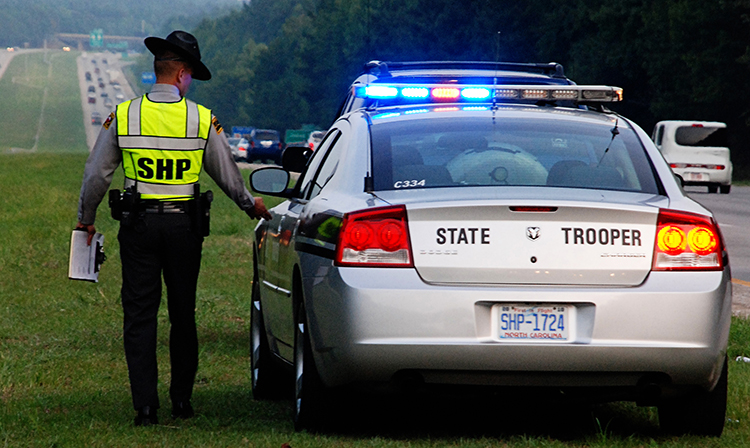
Photo Credit: Ryan Guthrie, NCDPS photographer
By Debbie Griffin. In spite of rapid growth and monumental increases in traffic, I-77 between here and Charlotte has just three more troopers assigned now than it did 10 years ago. The toll lanes, with what appear to be challenging transitions to general purpose lanes, are a wild card in terms of traveling safety when they open later this year.
“I think every law enforcement across the country is experiencing recruitment challenges,” said First Sergeant Michael Baker, who’s with the public information office of the North Carolina State Highway Patrol and Department of Public Safety.
He has provided information as area resident Michelle Ferlauto asked questions about how the

Ferlauto
new toll lanes about to open on I-77 soon will affect patrols and response times.
The 26-miles express-lanes project runs from downtown Charlotte to exit 36 in Mooresville. It includes two additional toll lanes in each direction from downtown to exit 28 in Cornelius and one additional lane in each direction the rest of the way.
Ferlauto said her research shows accidents along the project corridor have increased by about 60 percent since the project started in 2015. She once waited about 50 minutes for a state trooper to arrive at an accident scene.
Local condition part of national crisis
The U.S. Department of Justice’s Bureau of Justice Statistics tells some of the story: The number of officers dropped by 23,000 from 2013-2016.
Breaking down the DOJ numbers, it’s plain to see that local police feel the worst pinch right now. Their budgets are typically the smallest.
The overall number of agencies decreased by 50 from 2013 to 2016. The drop in how many law enforcement agencies are around is even more apparent when comparing 1997 to 2016, which shows a loss of 1,372 agencies.
The DOJ reports look specifically at full-time, sworn state police officers nationwide:
· 54,206 in 1997
· 56,348 in 2000
· 57,611 in 2003
· 64,872 in 2007
· 58,421 in 2013
· 59,645 in 2016
Especially in light of the most recent data released near the end of December, it’s not hard to find national stories about a “police recruiting crisis.” Departments engage in bidding wars and budgets shrink as population and traffic grow.
This phenomenon affects the cop-to-citizen ratio. For example, the DOJ data show how the ratio was 2.17 per thousand people in 2016 compared to 2.42 in 1997.
What’s the I-77 story?
Baker said the “base allotments” for an area are made according to the number of calls and population. He acknowledged response times are a point of data but said they can’t realistically be implemented when there just aren’t enough people to do the job.
He said the 2018 allotment in Mecklenburg County was for 33 troopers, and 28 of those positions are filled.
Ferlauto had asked Baker for current and past numbers for State Highway Patrol presence in Mecklenburg County. In 2009, it was allotted 28 troopers and had 26.
Statewide in 2009, the agency had 1,444 allotments statewide, with 1,384 of those slots filled. For 2018, the numbers were 1,409 allotments and 1,227 of those filled with troopers.
Baker said the plan for I-77 and the extra lanes is for existing troopers to use a rotational basis to cover the 26-mile expressway territory during overtime on their days off.
He said the tollway assignment will be exactly that – a trooper just for “road patrol” of the 26 miles of I-77 where express lanes have been added. Baker said there isn’t really a formula for how many more troopers will be needed to serve the extra lanes.
“I don’t think we have an actual contract yet,” he said.
Ferlauto has concern that the lack of troopers not only increases accident-response times but also diminishes the officers’ ability to do anything but respond to accidents.
She said, “So distracted drivers, texting, speeding, DUI or even normal stops where cars would be inspected like, say for drugs or human trafficking, aren’t possible.”
Ferlauto has doubts about how long the troopers-on-overtime approach will be feasible. She also suspects they have to come from a long way to respond in the Cornelius-Davidson-Huntersville area. She’s heard they have to “come from Monroe.”
Baker said each county – or sometimes two or three counties depending on the size – is a district. Each district is part of a troop. For example, Mecklenburg County is Division V of Troop H, which has a garage in Monroe and a substation in Huntersville.
However, the location of the base has little to do with response time, Baker said. A trooper is on patrol during all hours of their shift and could be anywhere in the district when a call comes, and they typically only go to an office to file paperwork. Bigger counties are also split into zones, and the idea is for a trooper to stay in his or her zone.
Responding to the recruiting crisis
Baker said he knows the personnel department of the SHP works hard to find and keep qualified troopers. He said not a lot of young adults are applying to be a trooper because they don’t see the money as commensurate with the danger and other grueling aspects of the job.
“Our standards are very high when it comes to procuring a member, whether they be male or female, to serve our state,” Baker said.
The basics on trooper qualifications are that a person must be between the ages of 21-39 years. All applicants must have completed law-enforcement training and certification by the time they are accepted and enter a stringent 15-week trooper school.
He said for some would-be applicants, it’s all about the money, while others recognize a general degradation in respect for law enforcement. Baker said the legislature did raise the starting pay for troopers last year, but that kind of thinking has to be sustained to account for cost-of-living increases and retainment, too.
Baker said the agency is always looking for more dedicated people. To apply for a position as a North Carolina State Trooper, visit its website at www.ncdps.gov and click the “careers that matter” tab.





